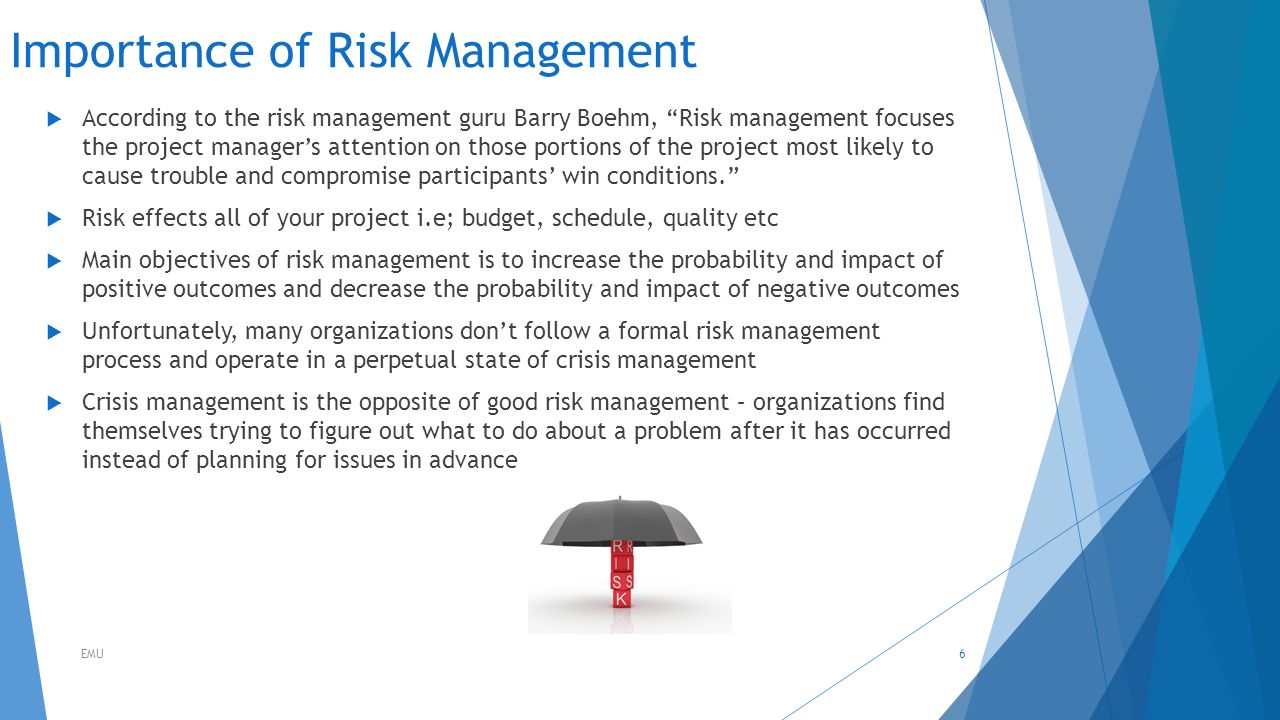Exploring the Increasing Importance of Risk Management in Organizational Strategy
Exploring the Increasing Importance of Risk Management in Organizational Strategy
Blog Article
The Value of Understanding the Relevance of Risk Management in Various Industries

The Core Concept of Risk Management and Its Objective
Risk Management, the keystone of many markets, pivots on the identification, assessment, and mitigation of uncertainties in an organization atmosphere. It is an essential method that permits companies to secure their properties, track record, and total survival. By correctly identifying possible threats, companies can create techniques to either protect against these risks from happening or minimize their impact. The evaluation process involves examining the chance and prospective intensity of these threats. The reduction procedure entails devising methods to lower their prospective influence once dangers have actually been identified and examined. This procedure is cyclical and ongoing, making sure that services are gotten ready for the ever-changing nature of Risk in various markets. The key function, thus, is to foster resilience in the middle of uncertainties.
Benefits of Executing Risk Management in Company Operations

Revealing the Duty of Risk Management in Different Industries
While every industry challenges its distinct set of dangers, the application of Risk Management strategies stays a common in their search of sustainability and growth. In the healthcare field, Risk Management requires ensuring client security and data protection, while in money, it involves mitigating financial investment threats and ensuring regulative go now compliance (importance of risk management). Building firms focus on employee safety and security, project hold-ups, and budget overruns. In the innovation market, companies alleviate cybersecurity threats and innovation obsolescence. Eventually, the role of Risk Management across markets is to recognize, evaluate, and alleviate threats. It is a necessary part of critical planning, enabling organizations to shield their assets, take full advantage of chances, and achieve their objectives.
Real-life Case Studies Showing Effective Risk Management
To comprehend the value of Risk Management in these numerous sectors, one can aim to a number of real-life instances that illustrate the successful application of these steps. For circumstances, in the power field, British Oil created Risk mitigation plans post the 2010 Gulf of Mexico oil spill. They carried out much better safety treatments and more stringent guidelines which dramatically minimized more mishaps. Likewise, in money, blog Goldman Sachs efficiently browsed the 2008 monetary crisis by determining prospective mortgage-backed securities threats early. Lastly, Toyota, upload the 2011 earthquake in Japan, revised its supply chain Management to decrease disturbance risks. These cases show just how industries, gaining from dilemmas, properly used Risk Management approaches to reduce future threats.
Future Trends and Developments in Risk Management Strategies
Cybersecurity, when a peripheral issue, has catapulted to the forefront of Risk Management, with approaches concentrating on detection, response, and avoidance. The integration of ESG (Environmental, Social, Administration) elements into find more info Risk Management is an additional growing trend, showing the enhancing acknowledgment of the duty that ecological and social risks play in business sustainability. Therefore, the future of Risk Management exists in the fusion of innovative modern technology, innovative approaches, and an alternative strategy.
Conclusion
In final thought, understanding the value of Risk Management throughout a range of industries is essential for their long life and prosperity. Customized approaches can help alleviate potential dangers, safeguard possessions, and foster stakeholder trust. Furthermore, proactive decision-making aids in governing conformity and enhances source usage. Ultimately, successful Risk Management adds to a lot more lasting and durable companies, highlighting the value of this practice in today's dynamic and extremely competitive company atmosphere.
While every industry confronts its one-of-a-kind set of risks, the execution of Risk Management strategies remains an usual in their search of sustainability and development. In the medical care field, Risk Management involves making sure individual safety and security and information protection, while in finance, it includes mitigating investment risks and ensuring governing conformity. Eventually, the duty of Risk Management throughout markets is to identify, assess, and minimize risks. These instances demonstrate how sectors, discovering from situations, effectively used Risk Management approaches to lower future dangers.

Report this page